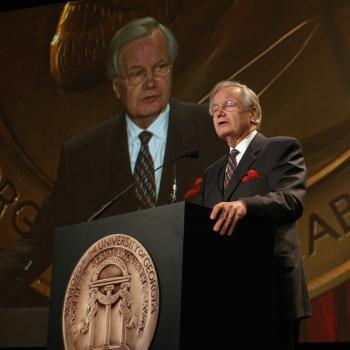
Reconciling Creationism & Science: Faith Meets Big Bang
The creation story generates more questions than answers, whether you’re a Christian reading Genesis or a scientist studying data from the James Webb Telescope. One fundamental question is this: Did God set off creation with a big bang?
There is a great deal we don’t know about the universe. We cannot even answer the most basic questions. Did creation really begin with a big bang, as many scientists suggest? Was God the creating force?
Did the universe evolve over billions of years? Or did God speak everything into existence in six short days? Perhaps the Almighty created the entire universe and everything in it with no concession to time, which he also created.
NASA offers a scientific explanation and images of what may have happened at creation. And it doesn’t quite mesh with the literal interpretation of Genesis 1 held by some Christians. Yet, the differing explanations aren’t necessarily in conflict.
Perhaps they merely reveal different sides of the same truth – a truth that is based on faith and science. They tell us the same basic creation story, but they have different perspectives and different time frames.
In the Beginning… What Happened?
People have looked at the night skies for centuries and wondered about and argued over religion and science.
The King James Bible is almost poetic in its description of creation. It says: “In the beginning God created the heavens and the earth” (Genesis 1:1). The story continues in Genesis 1:3 with these words: “And God said, ‘Let there be light,’ and there was light.”
Scientists may be less eloquent, but many of them also say there was light at the dawn of the universe.
Was Earth Created 6,000 Years Ago?
The Bible offers no detailed explanation of how or when the universe and earth formed. However, some Christians believe God created the earth about 6,000 years ago. They base their estimate – called Young Earth Creationism — on a literal interpretation of the Genesis story and on biblical genealogy.
Christians who believe in Young Earth Creationism are convinced that every word in the Bible is literally true. They hold onto their belief despite scientific evidence that indicates the universe is roughly 14 billion years old, and the earth came into existence about 4.54 billion years ago, give or take a few million years.
Creationists generally reject scientific explanations because science leaves God out of the creation story and because they accept their holy books as literally true.
The three Abrahamic religions — Christianism, Judaism and Islam – teach that God is the creator. Period. And many followers of these religions don’t care that the Protestant Bible, Torah and Qur’an are short on details.
Even so, early Christians argued about creation theories. Some of these Christians, including church leaders, interpreted the biblical creation story literally, while others saw its descriptions as symbolic. The latter focused on finding theological truths rather than determining when and how the universe was created.
A Centuries-old Debate
The centuries-old debate doesn’t bother me. I accept the “omni-“ words people use to describe God. That is, omnificent (all creating), omnipresent (being everywhere at the same time), omnipotent (possessing unlimited power and authority) and omniscient (having unlimited knowledge).
As the creator of everything, God doesn’t operate on a schedule of 24-hour days and seven-day weeks as we do. In fact, he doesn’t operate on any schedule. Time is meaningless to God, and billions of years might as well be a few days to him. Our measurements of time mean nothing.
Now, for a moment, sit back and think about these mind-blowing concepts. Billions of years, billions of light years and God himself are impossible for human beings to comprehend. But I believe they are true.
I see God as the creator of a universe that has taken billions of years to evolve – a universe that’s still evolving. Breathtaking images from Hubble and the James Webb telescopes beautifully confirm parts of Genesis 1 for me.
Set the Material World Aside
The Bible was never intended to be a science or history textbook, and it isn’t written like one. It sets the material world aside for the most part and focuses on spiritual matters.
It teaches us about God, morality and the promise of salvation and eternal life through faith in Jesus Christ. And in doing so, it lays the foundation for many people’s lives.
Brilliant Theological Advice
As the Rev. Dr. Ernest Lucas says, “When reading any particular passage (of the Bible), we need to ask some basic questions: What kind of language is this? What kind of literature is this passage? For whom was it written? What is its purpose?”
The answers to these questions matter.
“When reading the Bible, it’s good to make the process a deliberate one,” Lucas says. “This is especially important since the Bible was written millennia ago and comes from a cultural and historical situation very different from ours.
“We may misinterpret it if we simply assume that we can read it as if it was a type of literature we know today,” says Lucas, who is a good authority to consult. He has doctorates in science as well as theology. And he conducted biomedical research for several years before becoming a Baptist minister and teaching biblical studies.
The advice Lucas gives on studying the Bible is brilliant. In fact, it’s probably the best advice on how to study the Bible that I have ever heard. We need to dig deeply when we study the Bible. Hitting the highlight is no good.
A Point of Light and Truth
Many scientists believe that the universe began with a big bang. Perhaps it did, and it if did, I am certain God was at the heart of it – not because I can prove it but because I have faith.
The big bang theory is just that – a theory that’s open to scientific debate and study. Only recently, the James Webb Telescope (JWT) provided new information about the early universe that’s causing many astrophysicists to rethink some existing notions about creation.
The scientific community’s current explanation is that the universe began as an extremely hot and dense point that began to expand and cool. The universe has continued to expand over billions of years and will continue to do so indefinitely, some scientists suggest.
It apparently began with light, just as the Bible says, and it evidently was created by an unimaginably strong and intelligent force. For Christians and others, the intelligent force was God.
Making Up Your Own Mind
I respect people’s right to believe in creationism, although I don’t share their belief, and I leave scientific theories to astrophysicists and other scientists.
I’ll continue to marvel at the JWT’s stunning images of God’s creation and study the Bible. I cannot begin to understand astronomy, but if I had any doubts about God, NASA’s images would solidify my faith.
A good place to end this post is with a link to “Making Your Mind Up About the How of Creation” on the Christians in Science website. It provides a list of short online articles, short books and in-depth explanations of creation by authors such as Richard Dawkins, a world-renowned evolutionary biologist and atheist, and Francis Collins, a Christian and former director of the Human Genome Project.
All that said, what do you think?













